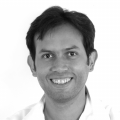BRIEF
Every city has its own personality; it is located in a territory that provides natural and cultural context to it. The interrelation of these factors, its flows and its systems network, plus the cultural model are what, little by little, shape a new reality, which is what we now identify as the city: these processes allow for a city to be or not, a cultural focal point of a country or region. GSS17-MTY will explore these natural and cultural behaviors as a starting point for understanding the city as a system of systems, seeking to identify potential models of the new nature of the city, finding their interconnections and developing prospective patterns for the production of new urban spaces through advanced technologies. The connection between new models of public space, generation of data, and advanced manufacturing methodologies will be explored through the exchange of data and interaction at the GSS17-MTY.
Monterrey is one of Mexico’s cultural focal points, with a great industrial tradition and accelerated growth, processes that aid in the generation of the city we have today, hence when visiting Monterrey you ask yourself what the city really is and what the limit is between the ideal theoretical model and the relativistic evolution of a territory.
STRUCTURE
Global Summer School MTY is a full-time two-week course that provides both practical and theoretical knowledge. Its structure consists in three main learning modules, led by expert tutors. In addition, lectures by renowned professionals and academics relevant to the topics to be treated during the course. These will be broadcasted in the different node-cities, all globally connected. The lecture program will be announced prior to GSS commencement. The following three course modules aim towards a common objective: the fabrication of a 1:1 urban machining intervention, transferring and digitally interrelating multiple sets of data collected from hyper-connected cities.
Concept
(Urban Strategies and Technology)
Coding
(Generative Design and Data)
Prototyping
(Fabrication and Robotics)
TUTORS

Fernando Meneses-Carlos
Director of graduate programs at the Art, Architecture, and Design Division at the Centro Roberto Garza Sada of the Universidad de Monterrey and co-director FabLab Monterrey
He earned his undergraduate degree in Architecture from the Universidad Nacional Autónoma de México. He also holds a degree in philosophy from the Universidad Autónoma de Chihuahua, a master’s degree in Genetic Architecture from the Universitat Internacional de Catalunya and a master’s degree in Advanced Architecture from the Instituto de Arquitecturas Avanzadas de Catalunya.
Additionally, he earned a master in Cultural Anthropology from the Escuela Superior de Ciencias Históricas y Antropológicas, and was awarded the Fab Academy Diploma “How to make (almost) anything”. He is currently pursuing the doctorate in Architecture and Design from the Universitat Internacional de Catalunya.
He is the creator and cofounder of Nodolab, FabLab Monterrey, and Máquinas libres, among other initiatives. He has received awards such as the Xignux Award (first place): Energía Alternativa y Construcción Sostenible (Alternative Energy and Sustainable Construction); first place at the Bienal Latinoamericana de Arquitectura de Paisaje 2014 (2014 Latin American Biennial on Landscape Architecture) in the Obra construida (Built work) category, Wawa Pukllay urban scale, and first place in the Pushing the Boundaries Award, among other awards.
Throughout his career, he has collaborated in more than one hundred projects in Spain, Italy, Brazil, Costa Rica, Venezuela, the USA, the Netherlands, Norway, Iran, Taiwan, Mexico, Poland, Qatar, Colombia, China, Peru, and Panama.

Daniela Frogheri
Full time professor & researcher at the Department of Architecture, at the Centro Roberto Garza Sada of the Universidad de Monterrey and Co-director FabLab Monterrey
Engineer_Architect from the Universita’ Degli Studi di Cagliari, Master’s degree in Genetic Architecture from the Universitat Internacional de Catalunya (UIC) and a Master’s degree in Advanced Architecture from the Institut for the Advanced Architectures of Catalonia (IAAC). She is currently pursuing the doctorate in Architecture and Design from the UIC.
At the present she is full professor of Architecture at the Universidad de Monterrey (UDEM) and researcher of the FabLamMonterrey. Professionally, she has collaborated in more projects in Mind Browser & Believe Media, Los Angeles (USA), Guallart Architects, Barcelona Regional and the Ayuntamiento of Barcelona (Spain), Gijón Arquitectura Motril (Spain), Universitá degli studi di Cagliari, IAAC, UNAM, ITD, UAQ.
She is the creator and cofounder Nodolab, FabLab Monterrey, and Máquinas libres, among other initiatives. She has received awards such as first place at the Bienal Latinoamericana de Arquitectura de Paisaje 2014 (2014 Latin American Biennial on Landscape Architecture) in the Obra construida (Built work) category, Wawa Pukllay urban scale, and first place in the Pushing the Boundaries Award, among other awards.
She has enabled the development of interventions based on the generation of geometric and morphologic algorithms and artificial intelligence applied to design. It has also allowed the study of growth, configuration, and conformation processes to try to create a connection between abstract languages (logics, geometry, mathematics, and programming) with the human, social, and sensitive aspects of the world of space and perception.

Guillermo I. López Dominguez
Full time professor & researcher at the Engineering Faculty of the Universidad Autónoma de Querétaro
Architect (ITESM); Composer and Master in Art (UAQ). In Barcelona, he participated in the Master in Advanced Architecture (IaaC). Co-Founder of Echomaterico, international architects platform, which has participated in several competitions in the past years.
At the Autonomous University of Querétaro (UAQ), is currently teaching in the masters and undergrad programs of Industrial Design and Architecture and as researcher, is involved in several funded projects such as: the Experimental Solar Housing; A Technology Transfer Center for Agricultural Innovation in Amazcala where he is developing one of the core modules; co-directs Máquinas Libres, among others.
Professionally, he has been awarded the Young Artist Program of FONCA 2010-11 (National Fund for Culture and Arts). In 2013 was awarded the 9th Federico E. Mariscal Prize by CAEQ for the project of a Library at Juriquilla, and “Professional of the Year” by FECAPEQ. (Federation of Professional Organizations in Querétaro)
Since 2012, has developed several projects for the Autonomous University of Querétaro, including libraries, laboratories, workshops, judiciary facilities, and a cultural center in a complex of hangars at the former airport of the city. This year, his Center for Interdisciplinary Research at the Philosophy faculty is scheduled to open, including a library, research center, auditorium, public space, and the newest bookstore by Fondo de Cultura Económica, named “Hugo Gutiérrez Vega”. Current works include a Psychologic Clinic and an experimental food processing plant for technology transfer.
REQUIREMENTS
IAAC GSS is open to creative and innovative people who are interested in fields such as architecture, urban planning, digital fabrication, design, etc., searching for a multidisciplinary experience in an international environment. No previous skills are required, although CAD design, programming and digital fabrication skills are welcome. After the course, the participants will have gained theoretical and applicative knowledge about current urban innovative strategies. Moreover, they will become familiar with parametric software, data visualization and the use of digital machines. Non Mexican applicants should be aware that a visa may be required. Each participant is responsible to investigate what documents are required via the embassies in their country of origin. The school will provide a confirmation letter regarding the participation in the course, and will assist where possible in the process.
The fees of Monterrey Summer School are 700€(without accommodation) and 900€(accommodation included). The fee includes all material costs needed for the course and no additional registration fee is required. Flight tickets and food are not included in the fee. Each participant should bring his/her own computer with the software installed. Further details about the software will be given to the participants upon acceptance. In order to register to the Global Summer School, participants need to submit the online application form, where they will be asked to upload a letter of intent and a CV. Portfolio is not required.
Place
The course is going to take place in FabLab Monterrey / Roberto Garza Sada Center (CRGS), Universidad de Monterrey, México.
Date
The course will take place from the 3th until the 16th of July in 2017.
Credits
In the end of the course all participants will receive a Global Summer School Diploma.
Language
The official languages of the course are English and Spanish.


